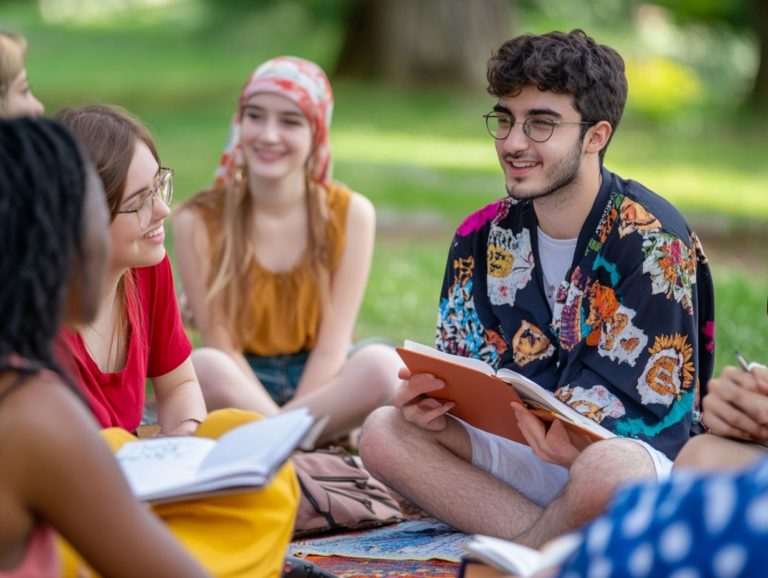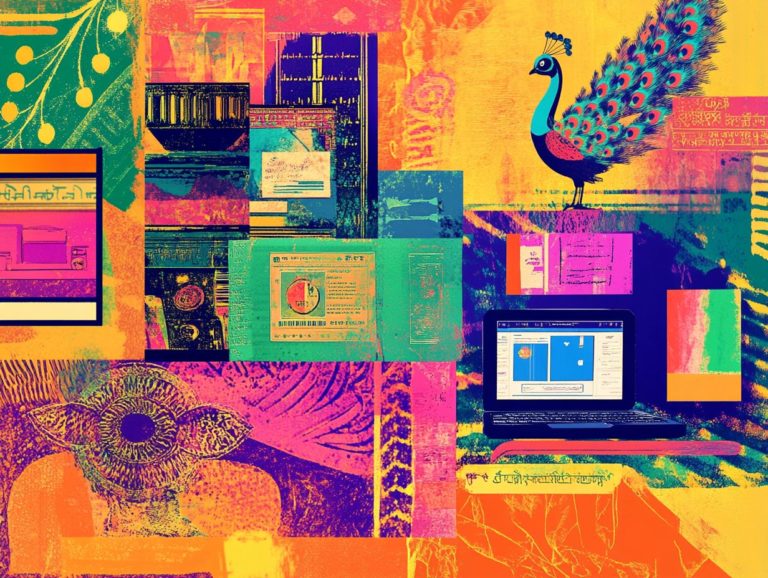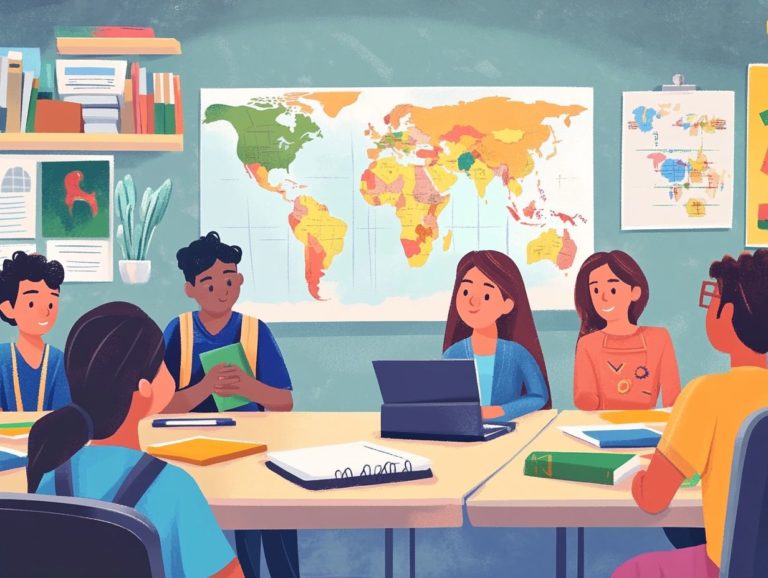5 language courses that encourage cultural exchange
In today s connected world, learning a new language isn t just a skill; it s your ticket to experiencing vibrant cultures and new perspectives!
This article presents five enriching language courses crafted to promote cultural exchange, ranging from immersive programs to engaging language exchange partnerships. It delves into the essential role cultural exchange plays in the language-learning journey, exploring its myriad benefits, potential challenges, and strategies to prepare for these transformative experiences.
Embark on this journey to expand your horizons and deepen your understanding of the world through the power of language.
Contents
- Key Takeaways:
- 1. Learning a New Language Opens Doors to New Cultures
- 2. Language Courses with a Focus on Cultural Immersion
- 3. Language Exchange Programs
- 4. Study Abroad Opportunities
- 5. Online Language Learning Platforms with a Cultural Component
- Why Is Cultural Exchange Important in Language Learning?
- Frequently Asked Questions
- What are some popular language courses that encourage cultural exchange?
- How does taking a language course abroad encourage cultural exchange?
- Are these language courses only for beginners?
- Do these language courses only focus on language learning?
- Can I receive college credit for taking one of these language courses?
- How can I find the right language course for me?
Key Takeaways:
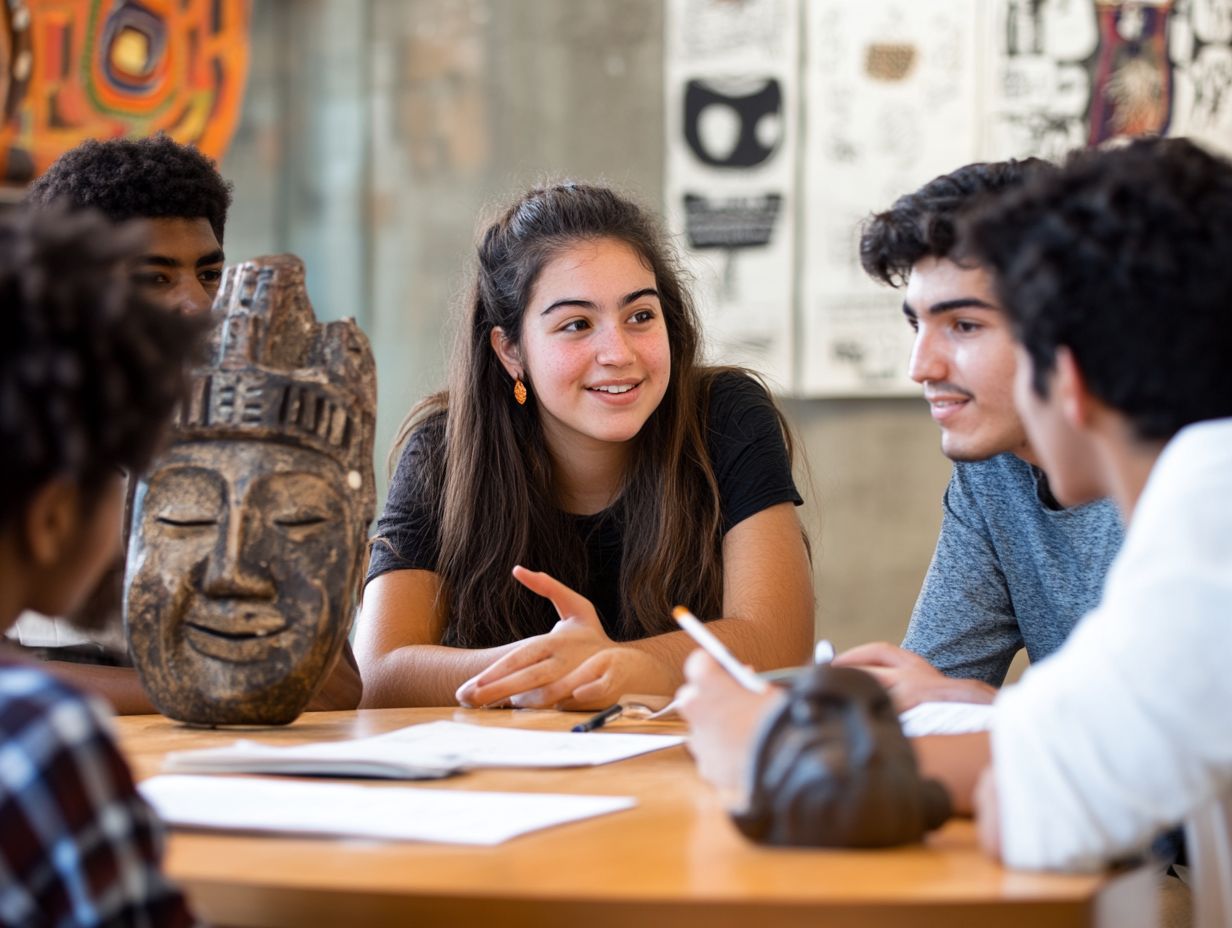
Learning a new language allows for a deeper understanding and appreciation of different cultures.
Language courses that incorporate cultural immersion provide a well-rounded learning experience.
Language exchange programs and study abroad opportunities create opportunities for cross-cultural interactions and personal growth, much like the 5 language courses with personalized feedback that enhance learning experiences.
1. Learning a New Language Opens Doors to New Cultures
Learning a new language isn t just about picking up foreign language skills; it s a transformative journey that immerses you in a vibrant tapestry of cultures. This experience fosters empathy and the ability to understand and respect different cultures, which are increasingly essential in our connected world.
By engaging with language programs and cultural events, you can go beyond the basics of vocabulary and grammar. Dive deep into the unique traditions, values, and communication styles of diverse cultures around the globe.
This exploration yields profound insights, such as recognizing how non-verbal cues differ from one culture to another. Such knowledge not only enriches your interpersonal interactions but also deepens your appreciation for cultural diversity.
As you become more skilled at navigating these cultural nuances, your interactions will flourish, becoming richer and more meaningful. This paves the way for authentic connections that transcend geographic boundaries, making your journey all the more rewarding.
2. Language Courses with a Focus on Cultural Immersion
Language courses that emphasize cultural immersion provide you with a remarkable educational experience, allowing you to engage deeply with both the language and the cultural contexts from which it originates. Exploring 7 ways to learn a language through cultural exchange significantly enhances your language proficiency and communication skills.
By integrating cultural events such as festivals and traditional ceremonies into the curriculum, you have the chance to experience authentic language use in meaningful situations. Not only does this make learning enjoyable, but it also reinforces your vocabulary and grammar through real-world application.
Using various teaching methods like project-based learning, where you work on real projects, and role-playing encourages you to navigate real-world scenarios, enabling you to actively practice your skills. As a result, immersion experiences foster not just linguistic fluency, but also cultural awareness, creating a holistic education that equips you for effective global communication.
3. Language Exchange Programs
Language exchange programs serve as remarkable platforms for fostering cross-cultural communication. You can practice foreign languages while gaining invaluable insights into different cultures, and exploring 5 language courses with community support enhances your interaction skills and emotional intelligence along the way.
These programs typically come in various formats, both in-person and online, allowing you the flexibility to choose what suits you best. In-person exchanges might involve casual meetups at cafes or community centers, where conversations flow naturally and you immerse yourself in the cultural nuances of your language partners.
On the flip side, online platforms enable virtual interactions through video calls and chat applications, giving you access to a global network of learners. This dual structure benefits you not only by improving your proficiency in a new language but also by enriching your understanding of diverse cultural perspectives.
Ultimately, this leads to enhanced communication skills that are invaluable in today’s connected world.
4. Study Abroad Opportunities

Studying abroad presents an exceptional opportunity for you to experience linguistic and cultural growth. By immersing yourself in foreign environments, you will enhance your language skills and deepen your cultural awareness through firsthand experiences.
These programs beautifully intertwine classroom instruction with real-world applications, encouraging you to engage with local communities. For instance, universities in Spain, such as the University of Salamanca, offer intensive language courses complemented by cultural excursions that showcase regional customs and traditions.
In Japan, institutions like Waseda University provide innovative programs where you can learn Japanese while participating in cultural workshops, such as calligraphy and tea ceremonies.
Through these immersive experiences, you cultivate a nuanced understanding of the language and its cultural context, transforming your education into something truly enriching.
5. Online Language Learning Platforms with a Cultural Component
Online language learning platforms that include cultural aspects are booming. They offer engaging tools like storytelling and cultural objects that help you better understand languages in their cultural settings.
These platforms provide a tapestry of experiences that go beyond basic vocabulary and grammar lessons. You can participate in virtual exchange programs that connect you with native speakers. Through these interactions, you refine your language skills in real-time and gain profound insights into the traditions, values, and everyday lives of the cultures you re studying.
Many users recount success stories illustrating how these vibrant, interactive environments have dramatically boosted their confidence and fluency. By engaging in collaborative projects or storytelling sessions, you craft narratives that honor your heritage while embracing fresh cultural perspectives.
Why Is Cultural Exchange Important in Language Learning?
Cultural exchange plays an essential role in language learning, creating an environment where you deepen your understanding of different cultures while honing your language skills, especially with 5 language courses that offer real-life conversations.
This process promotes empathy and enhances your overall communication abilities in our diverse world. Consider participating in cultural festivals or exchange programs; these opportunities allow you to engage in genuine conversations and witness traditions firsthand, transforming abstract vocabulary into vibrant, real-world contexts.
Through workshops, cooking classes, or dance performances, you are exposed to linguistic nuances while experiencing the emotional depth and stories behind each phrase or expression.
This immersive interaction fosters a sense of kinship and shared joy, breaking down barriers and cultivating interpersonal relationships that go beyond mere language mechanics.
As you forge personal connections, you gain insights into perspectives that differ from your own, nurturing a richer, more inclusive understanding of humanity.
How Can Language Courses Encourage Cultural Exchange?
Language courses can elevate cultural exchange by embracing innovative teaching methods that highlight understanding diverse communication styles and cultural contexts. This approach prepares you to engage meaningfully with various cultures.
One particularly effective method is project-based learning, where you and your peers work on real projects together to tackle challenges, drawing from different linguistic backgrounds. For example, imagine participating in a language program in Spain that partners with students from Mexico to create a documentary about cultural festivities. This thrilling experience lets you share personal stories and traditions while honing your language skills.
Collaboration with native speakers can take on many exciting forms, such as online language exchange platforms or cultural immersion experiences. These methods have proven remarkably successful in bridging cultural gaps, enhancing the authenticity of language acquisition, and fostering lasting global friendships.
What Are the Benefits of Cultural Exchange in Language Learning?
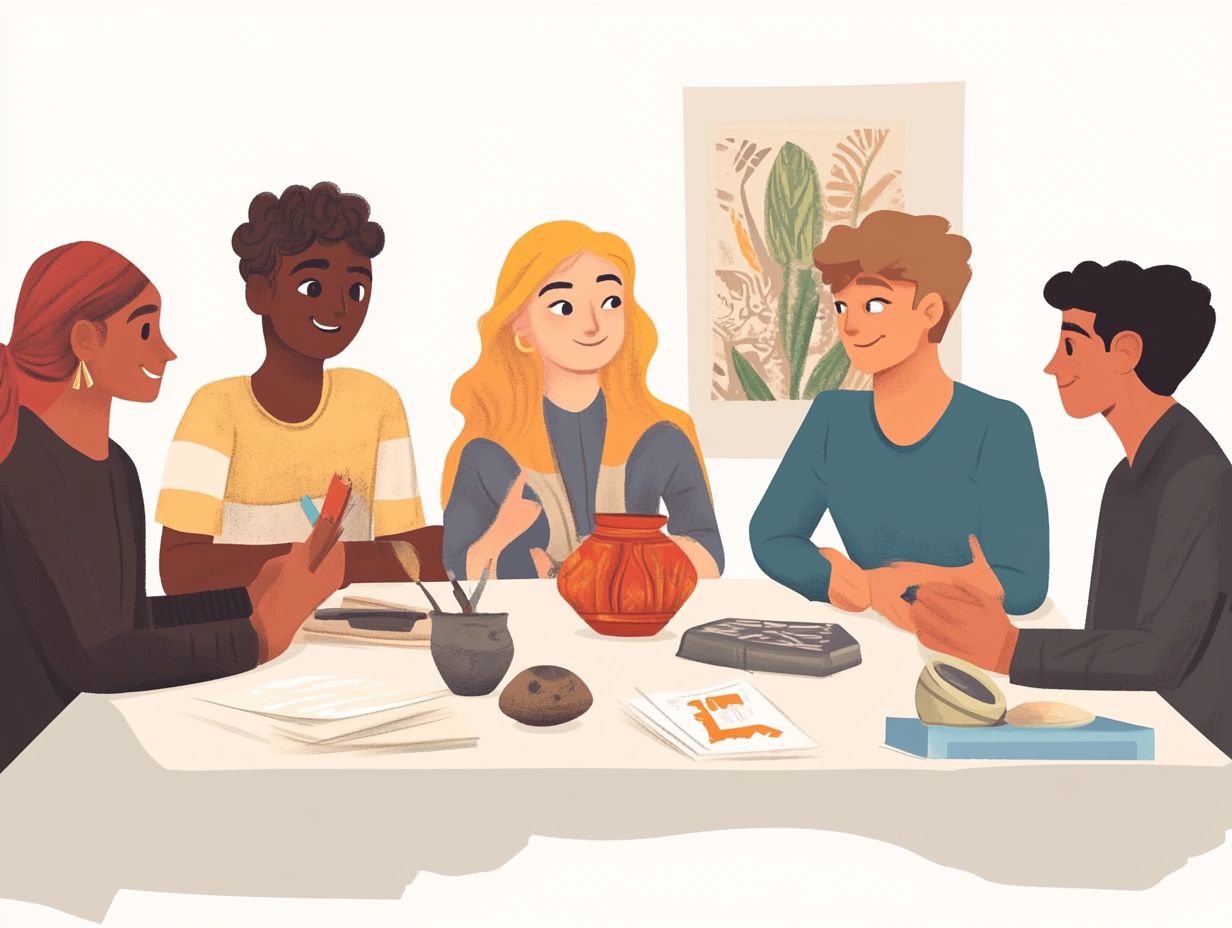
The benefits of cultural exchange in language learning go beyond just picking up a new language. They elevate your cultural awareness and cultivate empathy while also providing you with the skills necessary to navigate the complex social issues of our globalized world, as outlined in how language courses enhance cultural understanding.
This approach allows you to engage with a variety of perspectives, ultimately shaping a more informed and compassionate worldview.
For instance, research shows that 93% of participants in cultural exchange programs reported improved communication skills. This enables them to build meaningful connections across cultural divides.
Testimonials indicate that these journeys lead to better career opportunities and a revived sense of purpose. Understanding social issues is vital in today s interconnected society.
By immersing yourself in diverse traditions and values, you become a more effective communicator and develop the ability to think critically about pressing global challenges.
How Can Cultural Exchange Enhance Language Learning?
Cultural exchange enhances language learning by offering language courses that offer cultural immersion experiences that engage both your mind and heart. This fosters emotional intelligence and cultivates deeper connections with the language.
When you immerse yourself in vibrant cultural festivals or local traditions, you’re not just practicing vocabulary and grammar. You absorb the nuances of expression and body language that native speakers convey instinctively.
For example, imagine attending a Diwali celebration. You dive into conversations about the significance of lights and sweets, seamlessly integrating your language skills into rich cultural context.
Similarly, a traveler who pairs Spanish lessons with local fiestas often reports newfound fluency. They attribute this to engaging in real-life scenarios, sharing laughter with locals, and grasping idiomatic expressions that textbooks often miss.
These experiences resonate emotionally, making the language not just memorable but unforgettable. They transform mere words into powerful vehicles for connection.
What Are the Challenges of Cultural Exchange in Language Learning?
Cultural exchange offers many advantages, but it also brings challenges. You must navigate differing cultural norms and overcome barriers in cross-border communication to truly benefit.
A significant obstacle is miscommunication, which often arises from differences in language proficiency and non-verbal cues that can lead to confusion. Cultural misunderstandings can stem from differing values and attitudes, resulting in perceptions of insensitivity or disrespect.
To tackle these challenges, engage in active listening and ask clarifying questions whenever uncertainty arises. Creating an environment of mutual respect and openness helps bridge gaps and encourages everyone to share their cultural contexts.
When approached thoughtfully, these challenges can become valuable lessons that enrich your understanding of diverse perspectives.
How Can Language Learners Prepare for Cultural Exchange?
Preparing for cultural exchange is crucial for language learners. It equips you with the cultural awareness and interaction skills needed to engage effectively with your host community.
To ensure a smooth transition, delve deeply into understanding the cultural norms and practices of your destination. Research local customs, greetings, and dining etiquette through online resources and cultural guides.
Consider joining workshops or online forums that focus on practical conversation skills and cultural sensitivity. Engaging with native speakers through language exchange programs can significantly enhance your communication abilities and boost your confidence.
By taking these actionable steps, you maximize your engagement during cultural experiences and truly make the most of your journey. Don’t miss out on this opportunity to grow!
Frequently Asked Questions

What are some popular language courses that encourage cultural exchange?
Some popular options include Spanish immersion in Spain, Mandarin courses in China, and French courses in France. You can also find Japanese courses in Japan and Arabic courses in the Middle East.
How does taking a language course abroad encourage cultural exchange?
Language courses abroad let students fully experience the culture. Daily interactions with native speakers enhance understanding of local customs and traditions, making them perfect for those seeking 5 language courses to build fluency quickly.
Are these language courses only for beginners?
No, these courses cater to all levels. They offer various instruction levels to fit students from beginners to advanced learners.
Do these language courses only focus on language learning?
No, these courses also include cultural activities. Cooking classes, city tours, and excursions enrich the learning experience and promote cultural exchange.
Can I receive college credit for taking one of these language courses?
Many accredited universities offer these courses for college credit. Check with your university or program provider for credit transfer details.
How can I find the right language course for me?
Research factors like location, cost, and program structure when choosing a course. Consulting a study abroad advisor or speaking with alumni can also provide valuable insights.

